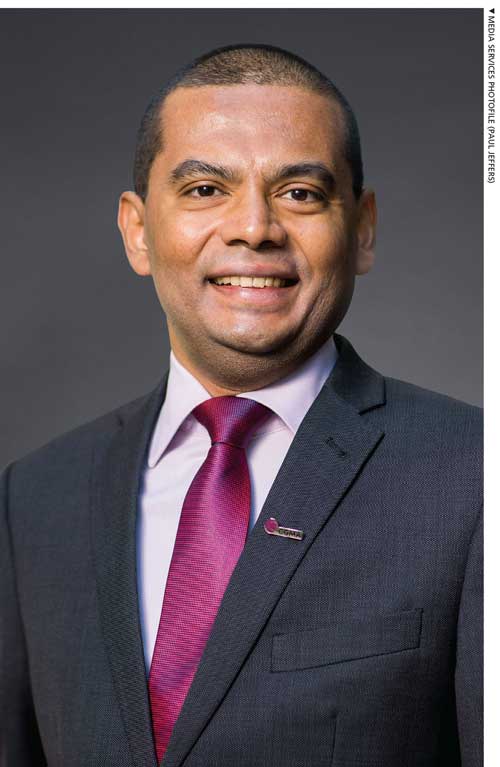
Imran Furkan
Collaborating for growth
Q: How can Sri Lanka move forward through business collaborations?
A: More than loans or multilateral-bilateral aid, business collaborations help bring sustainable inflows of foreign direct investment (FDI), and transfer skills and technical know-how.
They also open new markets for Sri Lanka’s products and services. As such, we should be promoting business collaborations more than other avenues of cooperation.
Sri Lanka must push for business collaborations as its preferred form of cooperation through more free trade agreements (FTAs), mergers and acquisitions, privatisations and removal of trade barriers – rather than government to government deals and unsolicited project proposals.
Q: And how can Sri Lanka forge stronger bilateral trade ties with Australia?
A: The key is to identify sectors we can improve trade in and focus on them rather than adopting a scattergun approach.
We also need to ensure two-way trade and not only exports so that Australia can grow as well. In this scenario, both parties will be invested in improving the relationship.
Finally, there must be quick and regular followups to initial inquiries. There are many complaints that responses from Sri Lanka’s state and private sectors to both trade and investment inquiries have been very slow if not nonexistent on numerous occasions.
Q: What is your take of the state of the IT industry in Sri Lanka – adopting or adapting to AI, for example?
A: The Sri Lankan IT and global business services (IT/GBS) sector has been growing slightly in US Dollar terms over the last couple of years; and it is on two tracks.
Established large players have been growing their staff numbers but billing from overseas headquarters so actual exports from Sri Lanka are hardly growing. Domestic IT/GBS companies are barely growing and looking only to expand overseas, which is happening slowly.
On the other hand, hardly any new big players are coming to Sri Lanka, which is a concern.
The economic crisis is having a significant impact through the brain drain and a loss of talent. When you are scarcely keeping your head above water, investing in AI is merely a pipe dream for smaller firms.
Meanwhile, bigger businesses are driven by the needs of their parent companies and major clients so there are some investments in new technologies.

Q: Could you describe the impact of digital and political disruption on countries such as Sri Lanka?
A: I barely see any real impact of digital disruption in Sri Lanka though other South Asian countries are seeing some of this, which is used to improve services for public and economic efficiency.
In Sri Lanka and other South Asian countries, there has been hardly any change in terms of political disruption.
The same political figures are in charge though there has been some shuffling of the deck chairs. But we’ve observed no real increase in participation among women, young people or diaspora in governance, so few or no new ideas and policies will be seen or implemented.
Q: So where is the digital world heading, in your opinion?
A: The digital world is increasingly empowering the individual to do things that previously only large global firms had the capacity to do. You can have a much bigger impact and footprint globally.
However, that also means threats can come from anywhere in the world with there being no ability to trace the origin. Overall, the world is shrinking and collaboration is increasing faster than at any time in history.
Sri Lanka must push for business collaborations as its preferred form of cooperation
Q: What advice would you offer Sri Lankans who are planning to relocate to Australia for work? And likewise, for business expansion?
A: Go for it! From a personal perspective, living and working in a developed country can be a wonderful experience. Once you’ve been here for a while, you can return to Sri Lanka or seek adventures elsewhere. The world is a big place.
And the same applies to businesses. Australia is a tough market to crack but the margins are good compared to developing and other developed countries, and you can do well in the long term.
Q: And last but not least, how would you describe Sri Lanka in the context of your connection with it?
A: I have been and always will be an eternal optimist when it comes to Sri Lanka.
So I continue to direct investment into the country and promote it at every given opportunity. Furthermore, I continuously seek opportunities to serve personally and hope to keep engaging with Sri Lanka going forward.
FACT FILE
FAMILY
Wife – Mariam Riza
Dog – Ollie (short for Oligopoly)
SCHOOLING
Royal College
HIGHER EDUCATION
MBA (Australia)
BA (Hons) in Sustainable Performance Management (UK)
QUALIFICATIONS
Fellow member of CPA Australia
Fellow member of the Chartered Institute of Management Accountants (CIMA)
PRESENT OCCUPATION
Executive Director of Programs, Business Development, and Corporate Services – Wattleshire
COUNTRY OF RESIDENCE
Australia
CITY OF RESIDENCE
Melbourne
CV IN A NUTSHELL
Imran Furkan is passionate about collaboration, fostering industry partnerships and connecting stakeholders.
This is evidenced by his achievements in senior management and directorships, leading organisations in diverse sectors such as trade chambers and industry bodies, media, not-for-profits, and technology, IT and global business services in the Asia-Pacific region.
